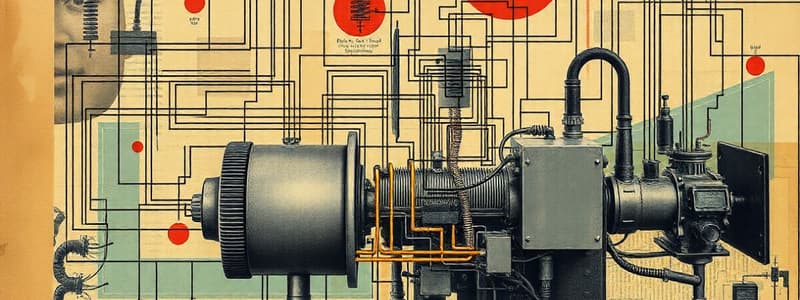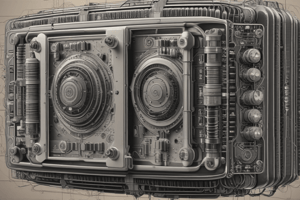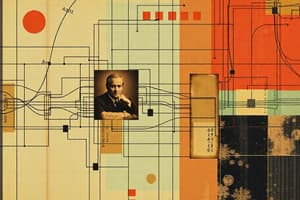Podcast
Questions and Answers
Flashcards
Pilot Lamp
Pilot Lamp
A small lamp indicating a circuit is energized.
Tesla
Tesla
Unit of magnetic flux in the SI system.
Voltmeter
Voltmeter
Instrument that measures the electrical pressure (voltage) in a circuit.
Electrical Conductor
Electrical Conductor
Signup and view all the flashcards
Chemical Energy
Chemical Energy
Signup and view all the flashcards
Inductance
Inductance
Signup and view all the flashcards
Integrating instrument
Integrating instrument
Signup and view all the flashcards
Complete Circuit
Complete Circuit
Signup and view all the flashcards
Push Button Symbol
Push Button Symbol
Signup and view all the flashcards
Frequency Increase
Frequency Increase
Signup and view all the flashcards
Cross-Sectional Area
Cross-Sectional Area
Signup and view all the flashcards
Capacitor
Capacitor
Signup and view all the flashcards
Kilowatt-Hour (kWh)
Kilowatt-Hour (kWh)
Signup and view all the flashcards
Conductance
Conductance
Signup and view all the flashcards
Resistors
Resistors
Signup and view all the flashcards
Rotor and Stator
Rotor and Stator
Signup and view all the flashcards
Semiconductor
Semiconductor
Signup and view all the flashcards
Volt
Volt
Signup and view all the flashcards
Class II, Division 2
Class II, Division 2
Signup and view all the flashcards
Study Notes
- A pilot lamp indicates when a circuit is energized.
- Power in DC circuits is the product of amperes and volts.
- The SI unit of magnetic flux is the Weber.
- A DC generator with the series field connected in series with the armature and the shunt field connected across the combination is a long shunt compound generator.
- A voltmeter measures electrical pressure in a circuit.
- Grease is a lubricant used to ease the pulling of wires or cables through conduit.
- Brass is an example of an electrical conductor.
- The start winding of a split-phase induction motor is switched out of the circuit by a centrifugal switch.
- Interrupting rating is the most important factor when selecting a circuit breaker.
- If 18 resistances of 36 ohms each are connected in parallel, the total resistance is 2 ohms.
- The current through a 1000 ohm light bulb connected to a 120V line is 0.12A.
- An electrolytic cell stores chemical energy.
- A 200V lamp with a hot resistance of 400 ohms has a power rating of 100 watts.
- To replace a 25W, 120V bulb, a 20W, 110V bulb is the closest approximation.
- A good capacitor has an infinite resistance reading.
- An inductor with a reactance of 10,000 ohms at 10 kHz has a reactance of 2,000 ohms at 2 kHz.
- Batteries have a nominal rating based on the number of hours of standard rate of discharge.
- Inductance is the property that opposes any change in current.
- A wattmeter is an integrating instrument.
- None of these break down rubber insulation.
- For current to flow, a circuit must be complete.
- A rectangle with PB inside represents a pull box.
- When the speed of an alternator's prime mover increases, the frequency is affected.
- The current-carrying capacity of a fuse depends on all of these.
- The resistance of a material is inversely proportional to its cross-sectional area.
- A 0.4 µF capacitor with a charge of 20 C has a voltage of 50 V across it.
- A 3-ohm resistor in parallel with a 2-ohm resistor, connected in series with a 4-ohm resistor, has a total equivalent resistance of 5.2 ohms.
- A 60-V source across a 12-kΩ resistance produces 5 mA of current.
- The current at contact separation in a circuit breaker is the interrupting current.
- When EMFs in transformer windings are opposite, the polarity is subtractive.
- Capacitors, synchronous motors, and synchronous condensers are used to improve/correct a low power factor.
- CPE stands for Continuing Professional Education.
- To reduce the current of a 15 A, 220 V electric iron to 12 A using a series rheostat, the rheostat resistance is 3.67 ohms.
- The commercial unit of electric energy is the kilowatt-hour.
- To achieve a 0.2-ohm equivalent resistance with a 1.0-ohm resistor in parallel, a 0.25-ohm resistor must be connected in parallel.
- An ammeter should be connected in series with the load.
- Three 120-ohm resistors connected in parallel-series have an equivalent resistance of 80 ohms.
- The two primary parts of a three-phase induction motor are the rotor and stator.
- Conductance is the ability of a conductor to allow current flow.
- Resistors are commonly used in electronic circuits to limit current, introduce a voltage drop, and generate heat.
- A permanent capacitor type single-phase motor is used for ceiling fans.
- Blue is assigned the digit value 6 in the resistance color code.
- Watt-hour is equivalent to 3,600 joules.
- A material with exactly four valence electrons is classified as a semi-conductor.
- A half-wave rectifier uses only one diode.
- A 2.5 A, 230 V water heater has a hot resistance of 92 ohms.
- The SI unit of potential difference is the volt.
- In hazardous locations, where combustible dust is not normally in quantities sufficient to provide explosive mixtures, it is classified as Class II, Division 2.
- In hazardous locations, the use of non-metallic conduit is permitted provided it is buried NOT less than 600 mm below the earth level.
- Service entrance cables must be supported every 300 mm within every service head.
- Locations where easily ignitable fibers or materials are handled and manufactured are Class III, Division 1 hazardous locations.
- Type MC cable support intervals should NOT exceed 1,800mm.
- The minimum computed load for a 2-wire laundry branch circuit is 1,500 VA.
- Before deviations from code requirements, written permission from the Code Enforcing Authority is necessary.
- An attachment plug serves as the disconnecting means for a single phase room air conditioner rated 250 V or less if manual controls are readily accessible within 1,800 mm from floor.
- An outlet is a point in a wiring system where current is taken for equipment use.
- Sheet steel metal boxes over 1640 cm³ shall be made from steel NOT less than 1.6 mm thick uncoated.
- Live vegetation shall not be used for support of overhead conductor spans.
- Circuits with rigid non-metallic conduit under streets should have a minimum cover distance of 760 mm.
- A conductor having no covering or insulation is a bare conductor.
- Lightning protection system conductors may be coursed through air without support for 900 mm or less.
- Type FC cable temperature ratings must be marked at intervals not exceeding 600 mm.
- The minimum computed load for exterior signs and outline lighting is 1,200 volt-amperes.
- The powers of the board members are vested to them under RA 7920.
- Energized generator parts exceeding 50V to ground must not be exposed.
- Single service drop buildings should only have one service. EXCEPTION all of these.
- Vehicle mounted generators should not be grounded.
- The current-carrying conductors in cablebus shall have an insulation rating of 75 °C or more.
- Air terminals exceeding 600 mm in height must be supported at a point NOT less than one-half of their height.
- Electrical equipment working space requires at least one entrance.
- Non-metallic boxes are permitted only with non-metallic sheathed cable.
- For straight pulls, the length of the pull box should NOT be less than 8 times the outside diameter of the largest shielded cable entering box.
- Armored cable is a fabricated assembly of insulated conductors in a flexible metal sheath.
- Raintight construction protects against water entrance during a beating rain.
- Marking of square millimeters of conductors, needs to be marked on the surface repeated at intervals not exceeding 600 mm.
- A splice must provide a path for current to pass through, a joint should be mechanically strong has wire, all splices should be mechanical and electrical secured.
- Roofs with a series of parallel ridges should have air terminals every 7,600 mm.
- Communication wires/cables shall be separated at LEAST 150 mm from service drops.
- At branch circuits, 20 or 30 A shall be permitted to supply cooking appliances that are fastened in place in any occupancy.
- Electrical reconnection after cut-off for non-payment does not require a new certificate if the cut-off period is NOT longer than one year.
- Conductor overcurrent protection is at supply point.
- A run of type IGS cable between pull boxes or terminations should NOT contain more than the equivalent of four quarter bends.
- Overhead conductors used in festoon lighting should be less than 3.5 mm².
- Fixed electric space heating loads should be computed at 100% of computed load.
- Usually circuit breakers in enclosed switchboards are derated to 80%.
- Open conductors should be separated by NOT less than 100mm.
- Motor circuit switches may be or not be of the knife switch type.
- Branch circuits larger than 50 A shall supply only non-lighting outlet loads.
- For optional calculation in dwelling units, the first 10 kW shall be computed at 100% while the remainder is at 40%.
- The clearance from the top of a switchboard to a combustible ceiling should NOT be less than 900 mm.
- Overcurrent device rating must not be less than noncontinuous load, plus a percentage of the continuous load @ 125%.
- Operating beyond normal or full load conductor rating is overload.
- Watercraft electrical permits are filed at the Maritime Industry Authority.
- The conductor clearance in concealed knob and tube wiring should be 76 mm.
- Liquidtight flexible nonmetallic conduit shall NOT be used where the voltage of the contained conductors is in excess of 600 V.
- Copper service entrance conductors shall have sufficient capacity and NOT be smaller than 3.5 mm².
Studying That Suits You
Use AI to generate personalized quizzes and flashcards to suit your learning preferences.



